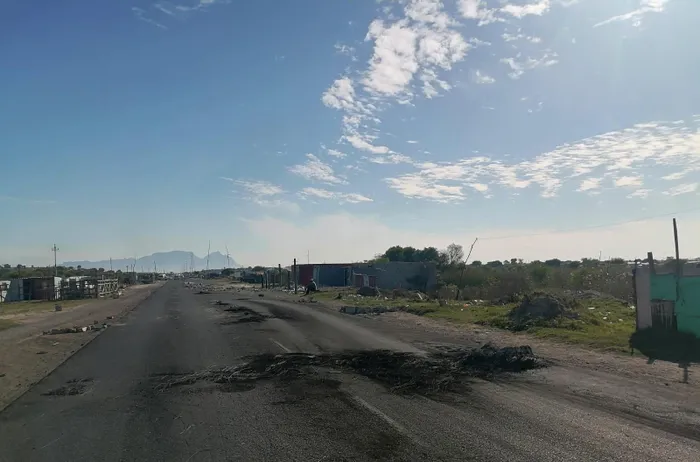Covid residents protest for basic services
For more than a week, residents living in Covid informal settlement near Driftsands have blocked Old Faure Road including part of the N2 near Mew Way in a protest over basic services.
The residents burnt tyres and rubbish and placed rocks in the road.
Resident Nolukholo Mqwetho said they are pleading for the City to install electricity, water and toilets.

The Old Faure Road, which stretches along the Covid informal settlement, has been blocked for almost a week during a violent protest over basic service delivery.
Image: Siyavuya Khaya
She said they moved onto the land five years ago and the City has not shown any sign of bringing services to the area.
Ms Mqwetho said they were aware that their leaders have had numerous meetings with the City and all their meetings seemed to be fruitless.
She said they were no longer interested in having more meetings with the City including the mayor and only wanted basic services.
“We have no choice but to use the bucket system as women while men use an open field to relieve themselves. When we are done, we have to carry our faeces to throw it in a nearby river. That is a huge embarrassment. We are making an impassioned plea with the authorities not to abandon us when they provide allocation of resources and think about us and know that we are South Africans. I feel like we are refugees living in camps,” she said.
Another resident, Siyavuyisana Nceba, said with winter upon them the polluted river overflows into their shacks and makes their living conditions horrible.
He said there is a broken pipe in the area which people get water from but some are far from it and are unable to access it.
He said he was extremely concerned about the cleanliness of the water coming from that broken pipe and fears that it might be contaminated and could potentially cause illness.
The City of Cape Town says it while respects the right of groups to protest peacefully, they will not tolerate intimidation, violence and the destruction of public and private property, damaging of roads and infrastructure and the infringements of rights of other law abiding residents.
"The City offers services where possible in informal settlements on its land – some land is not suitable for human habitation, such as on wetlands that hold high flooding risks, such as is the case in the majority of the settlements established during the Covid-19-era unlawful occupation crisis. It would often not be able to provide services such as underground water, electricity. Where it can, the City provides water and sanitation and electrical services as well as rubbish collection. In addition, the City works with finite resources and services are planned and budgeted for to accommodate those who have been waiting the longest, where services are feasible, or to cater to those settlements who are the extreme risk. The Covid-19 unlawful occupations, however, have primarily been on land not suitable for service delivery."